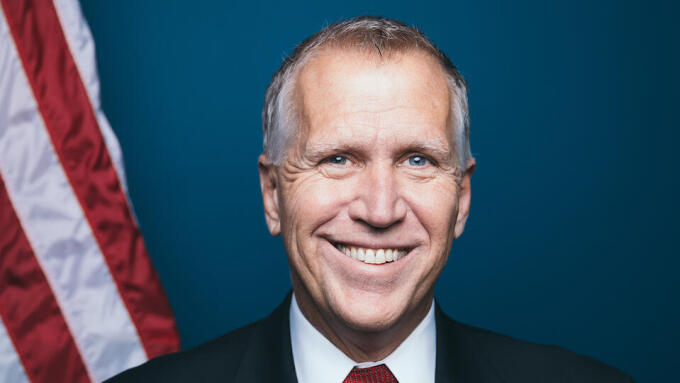WASHINGTON — Last night, as part of the $2 trillion COVID-19 relief bill sent to President Donald Trump for his signature today, Congress approved, in addition to the CASE Act, a controversial “felony streaming bill” written by Senator Thom Tillis (R-N.C.) that makes sweeping changes to the way video copyright claims are handled by authorities.
Tillis’ new bill, attached to the unrelated and much-needed COVID-10 relief package, immediately raised alarm among content creators, particularly on the Twitch platform.
Today, Tillis’ office clarified that the bill, officially named “the Protecting Lawful Streaming Act” (PLSA) will “apply only to commercial, for-profit streaming piracy services.”
Tillis’ office said that "the law will not sweep in normal practices by online service providers, good faith business disputes, noncommercial activities or in any way impact individuals who access pirated streams or unwittingly stream unauthorized copies of copyrighted works. Individuals who might use pirate streaming services will not be affected.”
However, Tillis’ office added, “Congress approved a new bill Monday that would classify illegal streaming as a felony offense, but the feds won’t be going after your favorite Twitch streamers, YouTubers or their subscribers. They’re more interested in services dedicated to streaming pirated content.”
A Quasi-Judicial Copyright Court
The CASE Act passed in the COVID 19-relief package is a different matter. As tech news site The Verge reported, “copyright activists [can’t] rest easy.”
“The multitrillion-dollar package did include a copyright measure that civil liberties activists fear could have dramatic consequences,” the Verge reported. The CASE Act “would create a quasi-judicial copyright claims court within the Copyright Office. Copyright holders could be awarded up to $30,000 in damages if they find their creative work being shared online.”
The CASE Act, as XBIZ reported, has been staunchly criticized by digital rights advocates such as the Electronic Frontier Foundation (EFF).
Purportedly benefiting small businesses and individual creators, the CASE Act could directly affect the relationship between studios, producers, clip-makers and tube sites in unexpected and unprecedented ways for current copyright enforcement practices in the adult industry.
The CASE Act, the EFF explained, “creates a new body in the Copyright Office which will receive copyright complaints, notify the person being sued and then decide if money is owed and how much. This new Copyright Claims Board will be able to fine people up to $30,000 per proceeding.”
According to the EFF, if an individual “gets one of these notices (maybe an email, maybe a letter — the law actually does not specify) and accidentally ignore it, you’re on the hook for the money with a very limited ability to appeal. $30,000 could bankrupt or otherwise ruin the lives of many Americans.”
Senator Tillis and the Wants of Big Entertainment Companies
According to the Verge and National Journal, Tillis has also been "circulating a draft proposal of a bill that would completely reform the Digital Millennium Copyright Act (DMCA)."
The new bill “would include a ‘notice-and-staydown’ provision that could make copyright bots, like YouTube’s Content ID, stricter. National Journal noted that Tillis’ office would limit this provision to ‘complete or near-complete works’ and would focus on larger enterprises rather than small platforms or creators. Still, current copyright-striking tech has been hit-or-miss.”
Tillis' aggressive reforms are in line with the wants of large stakeholders in mainstream entertainment who own franchises and lucrative creative IP.
Possible Adult Industry Repercussions
Adult industry attorney Lawrence Walters, of the Walters Law Group, told XBIZ that he thinks “burying these controversial bills into must-pass COVID relief legislation is dirty pool, but politics as usual.”
The CASE Act “was widely criticized when it was first introduced — now it will likely become law and change copyright enforcement procedures for creators and publishers,” Walters added.
According to the industry attorney, “the new criminal prohibitions on infringing website content will generate significant legal exposure for video sharing sites and potentially [their] hosts. It is doubtful that these bills were actually read by the lawmakers and [they apparently] received no reasoned debate in Congress. We will be living with the consequences of these bills for many years to come.”
Copyright management expert Jason Tucker of Battleship Stance — who consults with major adult industry clients on the subject — described the "copyright pork" inserted into the COVID-19 bill as "a poorly written law that was rushed through and is, on its face, problematic."
"The small claims portion was intended to help rights holders enforce their rights without the cost of litigating in federal court," Tucker pointed out. "The shortfall is that both parties have to agree to participate. One can simply opt out. I also don't like the idea of non-Article III judges making a ruling on copyright cases like Judge Judy. It will be interesting to see how that works if at all."
Tucker said he doubts whether "some of what Congress passed is even enforceable. The felony for profiting off of streaming sounds like a gift to the entertainment business, but I am anticipating it initially creating a mess."
"Here is the takeaway," he told XBIZ. "In all instances, if you are profiting from work that you don't own or have a license for, you can be held liable. If you lead from that thought process you can navigate the issues."






